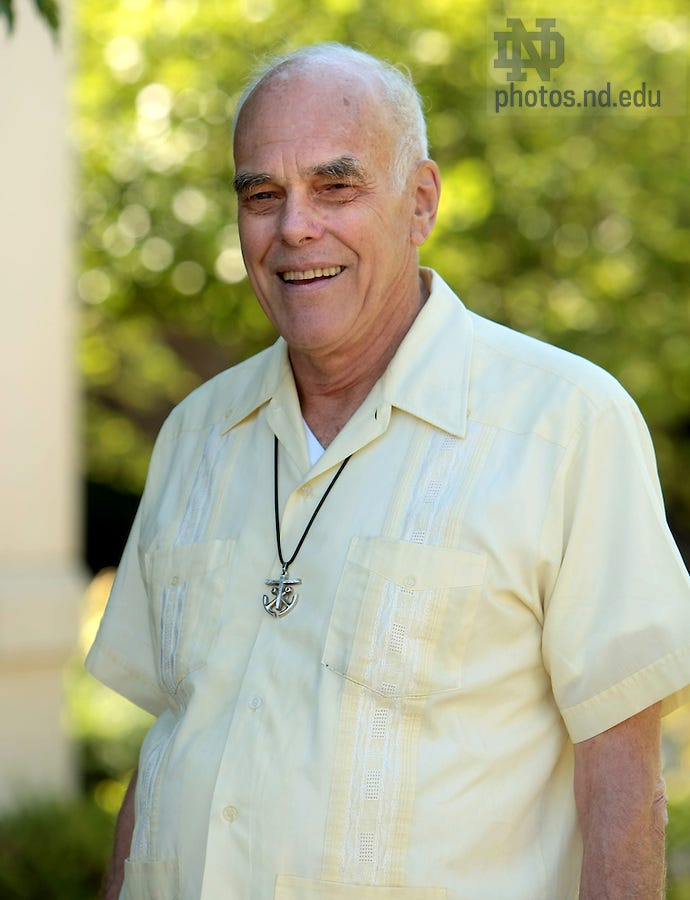This is just a note to mark the passing of David Burrell, one of the great philosophical theologians and religious scholars of our time, and a friend whose company was always for me a source of profound delight. He was a brilliant man, of course; that much no one doubts. His philosophical gifts were enormous and, for many of us of a certain age—or of a certain span of ages—his work was an indispensable influence in our intellectual formation. His 1973 book Analogy and Philosophical Language in a sense, in fact, quietly but firmly set the agenda for many of the most significant theological developments of the past half century in the Anglophone world; and everything he wrote thereafter was marked by his capacious intellect and even more capacious heart.
He was also a distinguished linguist and translator; and, while he took up his study of Arabic only relatively late in life, it allowed him to produce what he told my friend John Betz and myself only a few weeks ago were the books he was most proud of: his scholarly editions of Al-Ghazali on the Ninety-Nine Beautiful Names of God (1998) and Al-Ghazali on Faith in Divine Unity and Trust in Divine Providence (2000). His work in interfaith theology was also, for those of us with a real intellectual investment in the field, of absolutely central importance. (Our final conversation—in this world, at least—was largely concerned with Christian Vedanta and the writings of Sara Grant.)
His was in many ways not only an admirable life, but also an enviable one. He was, for one thing, very much a citizen of the world. Though officially a member of the faculty of Notre Dame for the past several decades, he managed to live the majority of those years in places—Israel, Uganda, Kenya, Bangladesh, and so forth—culturally richer and spiritually more nourishing than South Bend, Indiana (no disrespect intended to that perfectly habitable but largely forgettable University town).
It was a stroke that brought him back to South Bend from Bangladesh, at about the same time I was arriving at the Notre Dame Institute for Advanced Study; we were both in bad health at the time, but he bore his illness with far greater grace and humor than I did mine, and (I suspect as a result) his recovery was the more impressively rapid. His faculties were not at all diminished by his ailment, but he was reduced to relying on a wheelchair to get about. He never ceased missing Sub-Saharan Africa and Southeast Asia; he obviously found life in Uganda or Kenya or Bangladesh much more to his liking than life in the States. But, while it is probably very selfish of me to feel this way, I was glad to have him nearby these past eight years. Every visit to him at the Notre Dame care facility where he took up his final residence—“To spend the rest of my life giving thanks for all that God has given me,” as he put it—was a kind of celebration for me. He was always boundlessly joyful, witty, and acute. He was opinionated, mind you, and perfectly comfortable in declaring what his opinions were, but he did so always with charity and good will.
It was very easy to love the man, I have to say. It helped enormously, of course, that we shared so many of the same beliefs, convictions, and intellectual predisposition; in matters metaphysical, political, and spiritual, we were very much on the same page, so to speak. He was a redoubtable supporter of all my work; he was one of the most eager of those who provided endorsements for That All Shall Be Saved, for instance (yes, he was a universalist). But that was largely incidental to my feelings for him. Like everyone who knew him, I was drawn to his company by the sheer kindness, decency, and generosity that he radiated. I know I shall miss him keenly, but—curiously enough—the sorrow I feel just at the moment is a strangely buoyant one. I am grateful for the life he lived, but also absolutely certain of the beauty of the life into which he has now entered.





Visiting David often these past couple of years, our conversations never failed to turn to the great DBH, thanking God for the literary light and mystical vision that God has produced in you. I knew David as a young seminarian and priest in the late 1970’s, unable at that time to appreciate his philosophical genius. We saw each other episodically in Bangladesh and elsewhere over the years, but reconnected three years ago by which time I had re-discovered his prescient explication of Aquinas and was thoroughly immersed in your literary oeuvre. Our meetings at Holy Cross House were hour-long sessions basking in the intuition of being and the miracle of the ever-present creative, redemptive Now of God. My little books on Presence seemed to please him beyond what I could have imagined, and he said they complemented in a simple way what he spent his life saying in such a sophisticated way. You were always the trinitarian presence-in-absence in our conversations in David’s last days, and you are exactly right: there can be no doubt that David has been incorporated into the incomprehensible Beauty, Love and Bliss that every word he wrote was straining to express. I am so very happy you put this out in his honor. The love and beauty that inspires you is what he now knows as we desire.
Αιώνια η μνήμη.